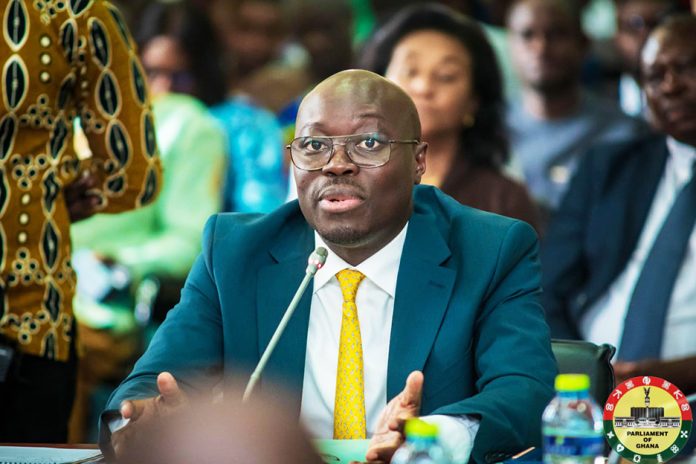On Monday, January 13, 2025, Parliament’s Appointments Committee vetted the Minister-designate for Finance, Dr. Cassiel Ato Forson. Read the questions and answers below.
Chairman, Bernard Ahiafor, MP, Akatsi South: Honourable members, I call upon the clerk of the committee to administer the oath.
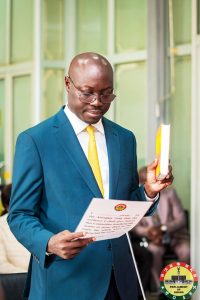
The nominee took the oath: I, Cassiel Ato Baah Forson, swear by the almighty God that the evidence I shall give before this committee touching the matter in issue shall be the truth, the whole truth, and nothing but the truth. So, help me God.
Ranking Member, MP, Effutu, Alexander Afenyo-Markin: Chairman, thank you. Just to make this point to the nominee. Dr. Forson, the practise of the House has always been that our leaders,because of the peculiar role they play, are treated in a certain way at vetting.
Because you are going to hold the public purse and you are going to be the most important person in this government, the face of all that has to be achieved in terms of fiscal policy, governance, spending, et cetera, please bear with your colleagues for some specific matters of policy.
I just want to assure you that this right of yours has not been waived.And I would want you to be assured over and over again that that is what all our leaders since 1997 have gone through. I watched the vetting of J.H. Mensah. I watched that of Alban Sumana Kingsford Bagbin.
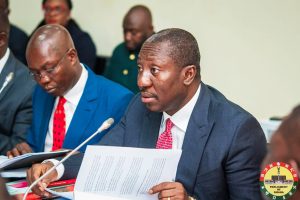
I watched that of Honourable Kyei-Mensah-Bonsu. I watched that of Honourable Haruna Iddrisu, Honourable Benjamin Kumbor. So, yours will not be an exception as in you being denied that.But there are some policy issues that the Ghanaian public will know. Because of the portfolio you are going to occupy. So please indulge us.Thank you very much, sir.
Dr. Forson: Thank you, Mr. Chairman. Thank you very much.
Chairman: May we proceed? Nominee, may you tell us about yourself.
Dr. Forson:
Thank you very much, Mr. Chairman. My name is Cassiel Ato Forson. I represent the good people of the Ajumako-Enyan-Essiam. In fact, I have represented them since 2009. So, this is my 17th year in representing my constituents. I’m a third born from a family of my mother side of seven. I have a wife; I have four children.
I’m currently the leader of the Majority side of Parliament. I’m also serving as the leader of government business as we speak. I have served in the past at the finance committee of which I served six years as a ranking member of the finance committee. I’ve been a deputy minister of finance for four years. I’ve been a minority leader in the last two years. Thank you very much.
Chairman: Honourable members, I will proceed to take a question from the subject matter committee members. I am guided by the minority leader and the ranking member that the first person to start questioning is Korkor Asante.
Korkor Asante, MP, Atiwa West: Thank you, Mr. Chairman.Honourable nominee, congratulations. Thank you. I know you mean well for the country, Ghanaians.You’ve been a deputy minister, so I know you come with a lot of experience. But honourable nominee, I’d like to just indicate that your answers here carry a lot of weight. The investor community, both local and international, are watching and listening to every statement that you make here today.
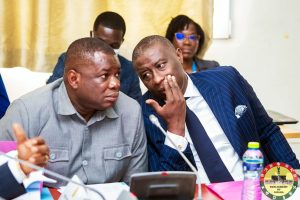
So, I just want to make sure that I know that you’ll be mindful. Of course, there’s no pressure. My first question, Mr. Chair. Honourable nominee, you’re on record, I believe on January 9th, it was reported by Reuters, that you’re going to request additional financing from the IMF. What proposal do you intend to present to the IMF?
Dr. Forson:
Thank you, Mr. Chairman. Inaccurate reportage. I did not say I am going to request for additional financing from the IMF. Inaccurate. What I said was we could request for additional finances if the need arises. Thank you.
Korkor Asante: My second question, honourable nominee, is government, like many other countries, depends on taxation as one of the major sources of revenue to fund development. As a matter of fact, one of the conditions of the IMF, the current arrangement with the IMF, is to enhance local revenue mobilisation.
The NDC party promised Ghanaians to scrap a number of taxes. How do you intend, if you’re giving a nod as the Minister of Finance, to bridge the revenue gap?
Dr. Forson:
Mr. Chairman, thank you. Let me say this is an excellent question. Mr. Chairman, Ghana currently collects approximately 13.8% of GDP in terms of tax revenue, according to the latest data I’ve cited as part of the transition. It is obvious that we can do better.
I’ve studied the Ghana economy for some time, and I can say without mincing a word that Ghana has huge potential when it comes to tax revenue mobilisation. You don’t necessarily have to increase taxes before you rake in revenue. We have the handles. What we need to do is to improve compliance.
I will work with the GRA, the tax policy unit of the Ministry of Finance, to ensure that we increase compliance and to raise the revenue as much as we can. In the medium term, it is my vision, when approved, to increase the tax revenue from 13.8% of GDP to about 16% to 18%. That we’ll be able to compare ourselves to our peers.
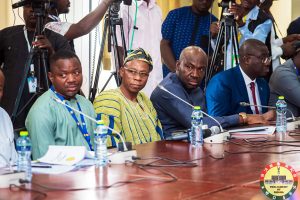
I believe the potentials are out there. It doesn’t necessarily mean we should increase taxes. Yes, we have obviously announced that we are going to scrap certain taxes. We’ll stick to just that. But it doesn’t also mean that we don’t care about the revenue.
We care about the revenue. And we will have to do more on revenue. But it doesn’t necessarily mean we should increase taxes. Some of the taxes out there are not bringing in the revenue that it should. For example, the betting tax is bringing in less than GH¢50 million a year. It’s a nuisance tax.
Scrapping GH¢50million will not mean anything in a way that will affect the economy if you are to adjust, particularly from the expenditure side. I mean, the noise with the betting tax at all does not comprehend the imposition of such a tax. And so, I believe that scrapping such a tax will not necessarily affect the forward march of the Ghanaian economy. Thank you.
Korkor Asante: Thank you, Mr. Chairman. Historically, there have been a lot of macroeconomic policy focused on inflation and exchange rates. Yet the AGI and others in the private sector still complain of high interest rates affecting their businesses.So, what are you going to do, given the nod? What are you going to do differently to ensure that our macroeconomic policies are more effective in lowering interest rates for the private sector? Thank you.
Dr. Forson: Thank you. I think government has a key role to play in this, particularly the fiscal authorities. I say this because if the country is actively in the market, borrowing in every week, I mean, every single week, we roll over GH¢111 billion. And if you were to roll over GH¢111 billion week in, week out, the interest rate will certainly go up. And you should also understand that interest rates sometimes are a function of inflation.
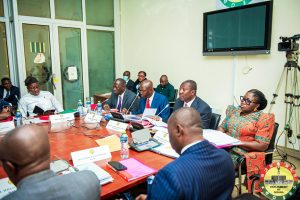 And that is why, personally, I believe there is the need for us to immediately work to bring inflation down. And then also work in such a way that we can stabilise inflation, stabilise the exchange rate, and create jobs. Until we do such a thing, certainly the concerns you’ve raised will still be there. And there’s a lot of work we have to do. It starts from the fiscal authorities.
And that is why, personally, I believe there is the need for us to immediately work to bring inflation down. And then also work in such a way that we can stabilise inflation, stabilise the exchange rate, and create jobs. Until we do such a thing, certainly the concerns you’ve raised will still be there. And there’s a lot of work we have to do. It starts from the fiscal authorities.
We need to cut expenditure. The time is now. We have to cut the waste. And if you cut the waste, you will certainly go to the market in a careful way that you will not be borrowing as much as you are borrowing today. And that in itself, you won’t crowd out the private sector, and you will be bringing down inflation in a way that interest rates will come down. Thank you.
Chairman: Thank you very much. The minority leader and the ranking member has one follow-up question.
Afenyo-Markin: Chairman, thank you very much. Leader (Ato Forson), you said in a response to our respected colleague’s question about tax revenue that as a nation, we don’t need to necessarily raise revenue through taxes.I mean, that’s the point. I want you to clarify the point then.
Dr. Forson: I said we do not necessarily have to raise tax revenue by increasing the tax rate. It doesn’t mean the same.
Afenyo-Markin: So how do you juxtapose that within the context of your previous position in respect of incentives to the private sector? We’ve had a private sector policy by the previous government where the whole intent was to free the space for the private sector so that they can invest more, so that they can employ more.
You held a position strongly against that incentive that taxes be necessarily imposed on raw materials that are imported for manufacturing purposes in the country, on equipment that are imported for manufacturing in the country, and all others.How do you juxtapose that?
Chairman: Honourable nominee, before you come to me.Honourable Mahama Ayariga is on point of order.
Mahama Ayariga, MP, Bawku Central: Mr. Speaker, Mr. Chairman, the nominee did not say that taxes should not be imposed on raw materials. The issue was whether or not taxes already imposed should be received or exempted by this House.So, let’s communicate accurately.
Chairman: Thank you very much, Honourable Ayariga. The nominee is capable of answering the question, so proceed to answer the question.
Dr. Forson:
Thank you, Mr. Chairman. Mr. Chairman, my position on tax exemptions is well known. I do not intend to hide from that, and I won’t hide from that. Mr. Chairman, tax exemption is gradually becoming a major source of tax expenditure in our fiscal framework.
Unfortunately, it’s not properly targeted, and so you see a situation where we exempt huge volumes of taxes to particular companies. At the same time, because we are exempting those taxes, we end up increasing these tax rates for so many other people to pay. I believe everyone else must be given the opportunity to pay taxes.
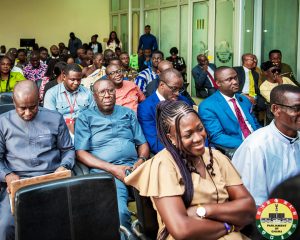
My concern, particularly with the one that you are making reference to, I’m sure it has to do with 1D1F, it is not transparent enough. I do not believe that certain individuals must be privileged enough to get tax exemptions, whilst others doing the same should not be given the opportunity to get tax exemptions.
And I have contended in the past that if the government insists on tax exemptions for 1D1F, they should put it in the law and allow everyone else to benefit from such tax exemptions. My main concern, particularly my criticism against the 1D1F, has to do with the opaque manner that it has been done in the past, and I still stand by that.
If the government, or if this current government still believes that tax exemption to 1D1F is irrelevant, then obviously my suggestion is put it in the law, let everyone benefit from it, but don’t let people choose and decide who should benefit from such a tax exemption. I think it’s wrong, and taxation must be fair. Thank you.
Afenyo-Markin: Thank you. Leader, I’m making this point as a result of what you just said.Yes, you complained of the lack of transparency, but for the record, an honourable Yaw Boamah is here. He chaired the committee. You may recall that as a result of those concerns, government at the time was able to meet those concerns to the extent that there was even a waiver on one item, raw materials.
In fact, let me say, not waiver, the raw materials component was taken out of the whole exemption, and through scrutiny, the request was very much reduced. Would you say that it was purely political because those concerns were addressed? But you still said no.
Dr. Forson:
Mr. Chairman, I have no regrets for saying no. I have no regrets in the sense that when these taxes were introduced, tax exemptions were introduced to us in this House, initially we were called upon to exempt approximately $458 million. Upon my insistence, the Minister of Finance went back working together with the Minister for Trade and brought it down to about $100 million.
So straightaway, I saved the nation approximately $400 million, about $358 million, obviously because of my insistence. I still felt there was a need for us to do more, and that $100 million, I could still see things that I disagreed.
Mr. Chairman, I have no regrets, and I think I did what was right for Ghana and for all of us, because clearly it wasn’t right for us to grant some of those tax exemptions. I wasn’t alone. Colleagues from the Finance Committee agreed with me, and together we fought it. But obviously I did not champion this alone.
Let me also use this platform to pay tribute to Honourable Kwaku Kwarteng. Honourable Kwaku Kwarteng was instrumental in the fight against these tax exemptions, because he agreed with me that these taxes were certainly not right, and we are working for Ghana.
And if we can save $558 million, look at the Accra-Kumasi Road. We could use that money to fix the Accra-Kumasi Road.I think it wasn’t necessary for us to approve that tax, and those concerned, it’s not personal, it’s not political, but we did it with the right intention, obviously for God and country. Thank you.
Chairman: Thank you very much.It’s now the turn of Honourable Fokuo Tweneboah.
Tweneboah Kodua Fokuo, MP, Manso Nkwanta: Thank you. Honourable Cassiel Ato Baah Forson, congratulations. You have been nominated as Minister-designate for Finance. I’ve got a few questions.
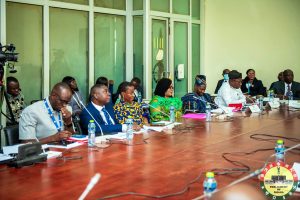 The first one, can you tell us how you are going to fund the government machinery, given that now there is no appetite for lenders to give money on long term, and the money market segment is already crowded, as you initially alluded to. So how are you going to fund government machinery? Lenders are not ready to give long term. The money market end is already crowded.Thank you.
The first one, can you tell us how you are going to fund the government machinery, given that now there is no appetite for lenders to give money on long term, and the money market segment is already crowded, as you initially alluded to. So how are you going to fund government machinery? Lenders are not ready to give long term. The money market end is already crowded.Thank you.
Dr. Forson:
Thank you, Mr. Chairman. Mr. Chairman, in the short term, we need to bring corporate capital gains back. It’s as important as anything. My proposal is for us to immediately introduce a very strong budget, signalling that we are ready to do the heavy liftings.
That first budget will indeed send the right signal that Ghana is ready to open our doors for investors to come into the country. I believe if we are to introduce strong measures, particularly from the expenditure side, we will be able to bring inflation down to 8% plus or minus 2%.
In doing so, we will be able to reopen the domestic bond market so that we can move away from the over-reliance of the treasury bond market, and so we will be able to, at a minimum, smoothen the harms that have been created as a result of the domestic debt exchange and the euro bond.
And so, we need to bring confidence back. But you know, if you are confronted with a situation where you do not have financing, then there is a need for you to look within. Let’s deal with expenditure. Let’s cut expenditure. Let us not pretend that there is money out there for us. Just like it has been done somewhere, we can also do it here. My proposal is let’s look at the expenditure side as well.
We shouldn’t always be borrowing and borrowing and borrowing. It’s time for us to cut the waste, and so I will lead the process to cut the waste. And I will need you, Honourable Members, to help me cut the waste so that we live and stay within the envelope that we can.
But when push comes to shove, obviously we will work with our development partners, such as the African Development Bank, the World Bank, the European Union, and other bilateral agencies, including the IMF, to raise cheaper sources of financing to finance government expenditure, particularly expenditures that can lead to proper growth and increasing growth. Thank you.
Tweneboah Fokuo: Thank you, Minister-designate: My second question, you’ve already given a hint on it, which relates to tax exemptions. Particularly, what I want to hear from you, or what I would expect you to tell this committee, is that the Exemptions Act of 2022, Act 1083, allows the state to take equity stake in entities that apply for tax exemptions.
This has never been applied, though the Act allows it.Can you tell this committee that under your regime, you’ll be bold enough to apply this aspect of the Act, that entities that come for tax exemptions, you’ll be ready to go in for equity stake for this country?
Dr. Forson:
Thank you. Mr Chairman, I think it’s not great we’ve done one, I think last year. Honourable Abena will bear me witness. Honourable Kwaku Kwarteng championed it. In fact, I seconded the motion for us to set a tone and allow to implement the Tax Exemption Act, particularly the portion that allows government of Ghana to take equity stake.
So, we’ve done once, and as a champion against tax exemptions, and someone who insists that tax exemption must also count, you can count on me that I will do whatever it takes, that when push comes to shove that we have to grant tax exemption, the country must benefit. You can count on me. Thank you.
Tweneboah Fokuo: All right.Thank you. So, everyone has heard and will be watching. My third question, you know it is commonly known that we generate really nothing much from the informal sector when it comes to taxes.And if you look at the mid-year budget of 2024, if you look at page 107, you realise that tax from PAYE, if you look at the revised budget, it’s about GH¢21.113 billion.
Whereas taxes from self-employed for the same period, just about GH¢1.572 billion. So, this is a ratio of 13 to 1. So, the formal sector, PAYE, revenue from those taxes, is 13 times what we get from all the self-employed.So, the gap is so big. What would you do practically to close this gap? A gap of 13 to 1. What would you do practically?
Dr. Forson:
Honourable Member, this is a very valid question and a very interesting one. I think there’s a genuine concern. First, we need to formalise the informal sector. Second, we need to encourage them to formally register with the revenue authority. And third, we need to incentivise them. We can learn from Uganda. Uganda has been able to incentivise the informal sector.
And as such, they are collecting more taxes from the informal sector than most of sub-Saharan African countries. The question is, what have they done? What Uganda did was to agree through tax education that a percentage of whatever you pay will be used as your pension contribution, even at the informal sector.
And so, my proposal is, why can’t we encourage or through taxes education, encourage the informal sector by instituting an informal sector pension scheme, where you will plough back, let’s say 30%, it doesn’t mean quote me for 30%, let’s say 30%, of whatever you pay as your contribution from your income tax, as your contribution to formalise the informal sector, and to incentivise them to pay.
The options are there. I’m open for advice. I will listen. And I’m ready, when I approve as Minister, to work with all of you to see what we can do to allow the informal sector also to contribute their widows’ mite towards the development of our dear country. Thank you.
Chairman: Thank you very much. I will then move to the majority side to take questions from the leaders of the Finance Committee.Starting from Honourable Isaac Adongo.
Isaac Adongo, MP, Bolgatanga Central: Thank you very much, Chairman. First, I want to congratulate my Honourable colleague, with whom I have worked closely over the years.But also, to thank His Excellency for the privilege to bring a thoroughbred finance person from this House, who has been involved in oversight for six years, and practise in government for another four years. When I was invited, I asked myself, what questions are there to ask Honourable Ato Forson?
Because we have always been on this side, proffering solutions, and I have been in meetings where you and I have led conversations on the way forward to save our country. All I can say here is that I believe that my colleagues are a better place, because I know your quality and what you bring on board.So, I have nothing to ask. Thank you very much.
Chairman: Thank you, Honourable Adongo.It is now the turn of Richard Acheampong.
Richard Acheampong, MP, Bia East: Mr. Chairman, thank you very much. Leader, congratulations.I have worked with you since 2013 to date, so I know what you stand for. So, Mr. Chairman, I have only one question for you. Mr. nominee, how do you plan to address the country’s fiscal challenges and ensure their sustainability? Thank you very much.
Dr. Forson:
Mr. Chairman, Ghana’s debt management in the past few years has been a major cause of concern. It is sad to know that the country has gone through a very difficult debt exchange domestic. It’s also sad to note that we had to restructure our euro bonds. In order to not repeat the past mistakes, we intend to establish an independent debt management office.
But in the meantime, we have a major harm that we have to deal with. For example, on the 18th of February, about GH¢6.8 billion will be due for payment.It is our responsibility to make sure we pay. And the Ministry of Finance, I believe at this time, are preparing to make that payment.
My responsibility is to make sure what has happened in the past does not repeat. And so, I will do just that. I will work with the Ministry of Finance. I will work with our development partners.I will do whatever it takes to avoid a second wave of the crisis we faced in 2022. That I can assure you.
Chairman: Thank you very much. Any further questions? In the absence of any further questions, it’s now the turn of Honourable Agnes Naa Momo Lartey.
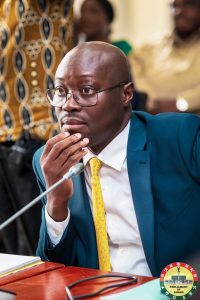
Agnes Naa Momo Lartey, MP, Krowor: Thank you very much, Mr. Chair, for giving me the opportunity to ask the nominee.I will begin by congratulating the Honourable Leader for this high office being nominated to. I would want to find out from the Honourable Nominee his general vision for revenue mobilisation. We’ve heard bits and pieces and it’s exciting to hear more what your vision is.Thank you.
Dr. Forson:
Thank you very much. I worked under Honourable Seth Terkper for four years, an astute practitioner. I learned under him. He used to meet the revenue authorities once every fortnight. As a result, we saw our revenue improving.
What I can assure you is that learning from Honourable Seth and seeing the way our revenue increased in the shortest possible time, I’ll go by the same approach. But aside that, I would dedicate a considerable amount of my time towards revenue mobilisation. Ministers of Finance often have not paid enough attention to revenue mobilisation.
I think we should not allow GRA alone to mobilise the revenue. The Ministers of Finance will have a role to play and I’ll play such a role. As I said, I will dedicate a considerable amount of my attention towards revenue mobilisation and to help improve the revenue. Thank you.
Agnes Naa Momo Lartey: I only want to wish the nominee very well.
Chairman: Thank you. Honourable members, it’s now the turn of Honourable Abena Osei-Asare to pose a question to the nominee. You have the floor.
Abena Osei-Asare, MP, Atiwa West:
Thank you very much. I see you are smiling because I’ve been in your shoes before. Less than a year ago, I was sitting here and you were sitting there firing questions at me.But I want to use this opportunity to congratulate you. I think you have worked very hard. You put us on our toes when we were in government.
And I hope to do the same constructively moving forward. So, I wish you well. Just one or two questions and that will be it because you are now moving there.You’ve been there before. You were there as a Deputy Minister. You are now going as the Supreme, the Finance Minister yourself.
And I know that a lot of decisions will rest or come from you. I remember that in 2023, during the budget, you mentioned the fact that His Excellency John Dramani Mahama would inherit a very difficult economy. This is in the parliamentary handsard at November 21st, 2023.That’s the page 35.
But at the end of 2024 and during the transition, we shared some economic data with you. You agree with me that we exceeded revenue. GRA exceeded revenue by, I think, GH¢400 million. It was GH¢178 billion or so. We exceeded by GH¢400 million.The economy grew from 2.9% in 2023, first half of the year, to 5.8% in 2024.
We managed to tame inflation down to 23.2% from 23.8% in December. The banking sector assets have also improved from GH¢274 billion in 2023 to about GH¢376 billion in 2024, October.The private sector credits increased by 28.8% from a negative of 7.5% in the same period last year.
The primary balance has improved from a deficit to a surplus. And we leave in a reserve of GH¢7.7 billion, representing 3.5 months of import cover compared to the 2.7 months of import cover of about GH¢5.9 billion in 2023.
And you also talked about the debt restructuring. And in there, we also told you how far we have gotten with that. We have done over 90% of that.We are left with just the private sector, the private base, and we will be done.
So, my dear friend, and we’ve known each other way back in our university days, so I can call him a friend. And so, my dear friend, with this data that you have been presented with, how would you describe the 2024 economy that you have inherited?
Chairman: Thank you very much, Honourable Minister.Nominee, over to you.
Dr. Forson:
Mr. Chairman, it’s early days yet to make a pronouncement on the 2024 outturns. As we speak, there’s no outturns for 2024. Because whatever you have is preliminary and cannot be said that it’s outturn.
I say this because the transition numbers she’s presenting, we did a transition between 9th to about 21st of December. It doesn’t give you end year numbers. Mr. Chairman, I heard her talk about revenue. But revenue alone will not give you a picture of the fiscal deficit. You will need to correspond it with expenditure.
I’m also aware that between 30th to 31st, we saw the Controller paying out about GH¢18 billion. So, GH¢18 billion as against the 400 that you gained. That’s a deficit. And so, let’s wait for end year numbers. I don’t want to speculate.
I will wait for end year numbers, and then I’ll present soon, if approved, to Parliament. Mr. Chairman, I want to learn from the former president. I will wait until then, before I make those statements. And when the time comes, I will present the true picture of the economy.
I don’t want to speculate at this point. Let’s wait for our chance. And the budget will be read, maybe next month, so that we don’t use this podium to create speculation. And to add to what the first questioner said, whatever we say here today, whatever we do here today, has implication. And it’s very sensitive to the market. And so, let’s be careful not to speculate. I don’t want to be pushed to speculate. ‘Sika mpe dede.’
Chairman: Honourable nominee, you know the rules. What is the meaning of Sikampe dede? Dr. Forson: Mr. Chairman, the former president spoke in French and twi. I don’t understand.
Abena Osei-Asare:
Thank you very much.So, Mr. Chairman, I’m glad my friend has confirmed this. Because in November 2023, the numbers presented were also published now.And yet, he was able to make a declaration on it. And so, in November 2023, all that he said was speculation, based on what he just told us.
That he will not speculate.He would rather wait for the outcome. Again, but in November 2023, the numbers based on which he made that statement were also provisional. And so, that’s by way of just letting him know that today he’s saying that he will wait and not speculate.
But in November 2023, these were the same provisional numbers that we gave out. And yet, he was able to make a declaration of the true state of the budget.Thank you, my brother. Okay, I move to my second question. And my second question is about resetting Ghana.That’s you. Yes. Resetting Ghana.And you are in the highest chair to push this agenda.
There’s a saying that once you first fix your macroeconomy, all other things will fall to you. But in your own manifesto, you’re saying that you want to shift from over-concentration on the macroeconomy and then prioritise microeconomy.
Looking at the current macroeconomy situation, can you say, as you suggested, that it is going to remain the same? Can you say that we have fixed the macro such that you can start quickly with your macroeconomy agenda that you gave out in your manifesto?
I just want you to share with us what you think you will do to hit the ground running, as you said in your manifesto, moving away from the macroeconomy, because you think you have fixed that for you, and then you want to ride on the back of that to continue with your macroeconomy, as you said in the manifesto.
Dr. Forson: Thank you very much. The macroeconomy agenda. Mr. Chairman, I want to leave this with us. Ghana is not out of the woods yet. In fact, we are still in the woods. And there’s a lot more work we have to do, as long as the macro is concerned. But it’s important for us to understand that. You don’t only grow the economy from the macro.
You grow the economy also from the micro. You don’t necessarily create jobs only from the macro. You create jobs from the micro. You don’t stabilise the cedi only from the micro. You stabilise the cedi also from the micro. Mr. Chairman, it is obvious that in the last many years, Ghana has overly concentrated on the macroeconomy.
I think we need to get back to basics. If you want to fix the cedi, and you fail to deal with the structural challenges we face as a country, you will firefight. In the end, it will be short-term. We need to deal with it. Yes, you can use the macro to deal with the short-term challenges.
But what about the micro? Now your oil revenue is dwindling by 30%, by 37%. And you won’t see this. You have hydrocarbon assets sitting, becoming stranded. What are you doing at the micro side to make sure you can pump in the revenue, bring the oil out, and then get enough revenue to support the economy?
What are you doing? You have a cocoa industry that is collapsing, moving from 968,000 metric tonnes per annum to less than 500,000. What are you doing? These are micro issues that we have to deal with.
And I believe that ministers of finance should not only be at the ministry just to pay people. That is only a function of the ministry of finance. But ministers of finance must and will have to also pay attention to the economic development mandates of the ministry.
So, I can assure you, what we said in our manifesto, we stand by it. We will have to do something different. And when approved, with your help, I will dedicate once again a considerable amount of my attention toward the development of the micro economy, the real sectors of our economy, to help create jobs and stabilise our currency. Thank you.
Chairman: Thank you very much.Before your next question, Honourable Buah has a follow-up question. You are done. Chairman, thank you.
Emmanuel Armah Kofi Buah, MP, Ellembelle: I think the question brought you to the cedi’s stability. You know the cedi has depreciated by over 30 percent. And it is really a matter of great concern.Can you outline some of the steps you will take to stabilise the cedi?
Dr. Forson:
Thank you, Mr. Chairman. Mr. Chairman, the Bank of Ghana alone cannot anchor the Ghana cedi. The ministry of finance will have to play a critical role in anchoring the Ghana cedi. Mr. Chairman, in the shortest possible time, it is our responsibility to make sure we reduce inflation to 8 percent plus or minus 2, the target value, in the shortest possible time. Inflation, 8 percent plus or minus 2.
And we will do that through a careful but strong, front-loaded fiscal consolidation agenda, expenditure-based, for the purpose of it. And when we are able to do that, it will help the central bank, the monetary authorities, to be able to save reserves and be able to protect the city, or come in to intervene when the need arises.
But let me also say that, all said and done, that is the short-term measure. But in the long term, as a country, we need to sustainably anchor the Ghana cedi with a number of policies. And the NDC, through our manifesto, we have announced a number of them.
First is the establishment of the Ghana Gold Board, so that we can use the gold in a way to bring in the needed forex to support the cedi, in the very short term. Second, as part of our manifesto, we said we are going to revitalise the palm industry and the cocoa industry.
We’re already in talks with the World Bank to have that and to make sure that happens. I believe the cocoa and the palm industry will also go a long way to support bringing the needed forex to support.
In fact, cocoa has been the mainstay of our economy over the years, until we said that the forex is not coming in. We have to do some work, obviously, with the non-traditional export as well. And most importantly for me, we also need to deal with the hydrocarbons.
That over the last eight years, Mr. Chairman, the questioner was a former minister for petroleum. He agreed with me that in the last eight years, we’ve not been able to bring upstream any additional oil field. That is a major concern. It’s not that we don’t have the oil, the oil is there. It’s not that we cannot get additional forex to support. But we need to be quick.
And these are things that the Ministry of Finance will have to play a very critical role. So, we will sustainably anchor the city by ensuring that these major policies are introduced in the shortest possible time to ensure that we can have a stable cedi.
And that’s my priority. As I’ve said this so many times, my priority is a stable cedi, low prices, and indeed, job creation. That is a priority. And I will work to make sure that happens.
Chairman: Thank you. Now, Honourable, your last question.
Abena Osei-Asare: Thank you very much, Mr. Chairman. Mr. Chairman, I heard my brother say that, according to their manifesto, there’s going to be a gold board being set up. And we also know that Bank of Ghana is also having this gold reserve programme.
So is it a new name for an existing programme, or Bank of Ghana will have to halt the current gold reserve programme to enable you implement the initiatives in your manifesto? This is just by the way. But my last question is this, my brother.
You mentioned that you’re going to work very well to improve our revenue measures and increase revenue from the 13.8% of tax GDP to 16%.I just want to let you know by way of information that it’s a revenue strategy policy of the ministry, that in the medium term, we’re going to take Ghana from the current position where we are to about 20%.
And I hope that you find time to look at it. And where you need to tweak it a bit, tweak it and make sure it is implemented for all of us to achieve this target that we have set for ourselves.Because at the end of the day, it is the revenues that will accrue to Ghana to enable us to do what is expected of us.
You also mentioned that you’re going to cut the waste. But you know in the public sector, expenditure composes of compensation, goods and services and capital expenditure.So, when you say you’re going to cut the waste, you’re going to cut the waste.
I’m afraid this is what we have. And unless you want to say you want to rationalise expenditure.But if you say you’re going to cut the waste, this is the component of it. Meanwhile, in your manifesto, you also mentioned that you are going to roll out this big expenditure and take it like this.
Chairman: Honourable Member, you are not asking questions.You are making statements.
Abena Osei-Asare: I am laying the preamble to ask the question because he will need that.
Chairman: The preamble cannot be a thesis.
Abena Osei-Asare:
Respectfully, Mr. Chairman. What I’m saying is that in your manifesto, you mentioned some big expenditure items.That one, you’re going to roll out the GH¢10 billion big push policy for strategic infrastructure, which is on page 24 of your manifesto. You also mentioned that you’re going to implement an economic transformation agenda, which is also on page 24 of your manifesto.
You mentioned that you’re going to implement the Ghana Framework for Industrialisation, Revitalisation, Support and Transformation, a.k.a. Ghana First.Which is also on page 37 of your manifesto. And your Holy Grail. That is the 24-hour economy.So, with your position of cutting waste and this huge expenditure items in your manifesto, how do we reconcile the two? Thank you.
Dr. Forson:
Mr. Chairman, thank you. Mr. Chairman, as for the waste, we will cut it. And it has to be cut. It has to be cut in such a way that you will not hurt growth and you will not hurt the vulnerable. But we will cut it. Mr. Chairman, I’ve been in this House for years. Sixteen years. During this period, I’ve learned a lot. I learned under Minister Terkper.
I’ve served on the Finance Committee for 12 years. I’ve been a ranking member for six years. I’ve been a minority leader for two years. Now I’m the majority leader. No one can convince me that our budget does not have waste. We need to cut them.
We need to come together, identify them and cut it. Mr. Chairman, the question is, the waste benefits only a select few. And then its unintended consequences affect all of us as a nation. It ends up breeding fiscal indiscipline, high budget deficit, financing, and in the end, we’ve seen the outcome is haircut.
That’s the outcome. But let me say, going forward, I will work for your good souls. In an open manner. So, that together we can work to save our country. Yes, the Honourable Abena made a point. That their medium-term revenue strategy is to increase the revenue from its current level to 20%. I hope that is not taxes.
Because from 13.8% to 20% in the medium term, two to three years, is very steep. Very steep. 13.8% of GDP to 20% is extremely steep. I’m not saying we cannot. But I will work to achieve it. But let me say that 13.8% to 20% is extremely steep. Have you been able to do it in eight years? The answer is no.
And so, unless it is domestic revenue, which include non-tax revenue. But I can assure you, I’ll have a look at all of those. And it is in our interest to increase revenue. And we’ll do whatever it takes to increase those revenues. Some of the things, again, we’ll do from the expenditure side is the establishment of an independent value for money office.
So that Parliament, working with us, will be able to set up a ceiling of government contracts that must go through independent value for money analysis that will be owned by the state. I think that must be done. And it will be the beginning of cutting the waste.
And Honourable Abena, I recognise that you’ve served at the Ministry of Finance for eight good years. During this period, I know, you worked on expenditure. You worked on revenue. So, with that, with your wisdom, help us identify some of the wastes you may know about. So, that we can cut them appropriately. Thank you.
Chairman: Thank you very much.It’s now the turn of Honourable Mahama Shaibu.
Mahama Shaibu, MP, Daboya-Mankarigu: Good morning. Thank you very much, Chairman.And good morning, Honourable Nominee, for a well-deserved nomination.
My question has to do with investment, the motivation that you have to give to investor confidence. Over the years, we saw major players in our business industry getting out of the country.Now, in the few weeks, however, I’ve seen some increase in the money market.
You have alluded to it here. The available data indicates that the last window of the government treasury bill was over subscriber, over 2 billion.Can you tell us what plans and measures you have to boost investor confidence?
Dr. Forson:
Thank you. Mr. Chairman, from our conversation, particularly the private sector, a lot of things came out. Distorted VAT regime. The need for us to simplify our taxes. An unfriendly working environment. I believe we need to listen once again to the investor community and the private sector.
And in doing so, we’ll work with them to come out of the blueprint that will encourage the private sector to boom. From the bond side, I don’t know if you meant by the money market side, the bond side. We need to immediately improve our credit rating faster. How do you improve the credit rating?
Your fiscal will play a role. And signalling to them that you are ready to do things differently. I’ve signalled already that we will undergo an expenditure-based, strong, front-loaded fiscal consolidation in the shortest possible time. So that, together, we can send a strong signal to the market.
Particularly when inflation is reduced. Today, it is very difficult for us to go back to the bond market. But for us to go back there, domestic bond market, I mean. For us to go back there, there are a few things we need to get right. Your credit rating and inflation.
Inflation today is 23.8. The highest in the last eight months. And you can see that inflation is inching up. It’s inching up by the day. Why has inflation become so stubborn? And I think it’s a question we need to ask. And what do we have to do to be able to bring inflation to a target of 8 plus or minus 2 percent?
It has to start from the fiscal authorities. And we will start. And we know exactly what we have to do. I need your nod. I need your support. And together, together, we have a responsibility to do what it takes to fix the economy for the benefit of all of us. Particularly the ordinary Ghanaian out there who is struggling.
So, I’m open, very open for ideas. And to listen to you, not only you, but to the private sector and the entire market. To do whatever you have to do. I’m a very lucky man. I come to this job apart from my personal experience.
But I worked under an astute finance minister, the Honourable Seth, who is like a father to me. I’ll reach out anytime. And there are a lot of people. And Honourable Abena is here. A sister in all. Honourable Amin, the former past minister. And so, let’s see. Whatever it takes, we’ll do it. Thank you.

